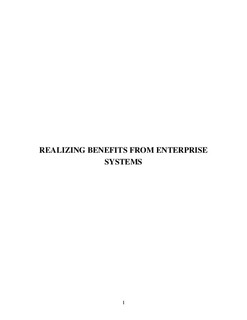| dc.description.abstract | Organizations are increasingly implementing Enterprise Systems (ES) and
Enterprise Resource Planning (ERP) systems in particular. Despite notable studies on ES
and their potential, many organisations are not satisfied with the benefits or advantages
gained. Research and industry reports have raised concerns about the return value from
ES, and they have examined that while many organizations obtain significant value from
these systems, there are still a considerable number of organisations who do not realize
substantial benefits, but encounter challenges to achieve these systems’ potential.
Therefore, many recent studies call for further contextual investigations to understand the
realization of benefits from information systems in general and ES in particular.
These recent calls claim that further research is needed to help organisations not
only effectively deploy ES after the physical implementation, but also improve their use
of the system and realize more benefits. New research efforts, thus, need to focus on
benefits actualization and technology exploitation. The body of existing research
encompasses many studies on realizing benefits from ES. Most of these studies address
the last stage of the implementation, which is called the post-implementation stage, and it
is in this stage that organisations realise the benefits of the system. Many studies have
suggested critical aspects needed to realize benefits from ES at the post-implementation
stage. However, it is assumed in this thesis that focusing exclusively on the postimplementation
stage to investigate improving benefits after the implementation of ES is
not sufficient. Many factors occur at various times and stages of the implementation that
influence the benefits realization afterwards. Hence, this thesis investigates how focusing
on the whole process, and not only on the post-implementation stage, is more appropriate
to develop a clear understanding of realizing the benefits from ES. Accordingly, the
research question (RQ) that motivates this thesis is:
RQ: What can organizations do to realize benefits from enterprise systems?
To address this research question, investigations were carried out of the
implementation of ES in two companies. The study adopted an exploratory case study
strategy. Primarily, qualitative data in the two cases was collected from interviewees who
had roles either in the system’s implementation or the system’s use. These
methodological choices have been undertaken in order to address the research question
that requires deep knowledge from practice. Five published articles present the study’s
findings, and this summary explains the research as a coherent whole.
This thesis integrates the findings from the published articles and suggests four
main contributions. First, it provides an improved understanding of the process that
enables organizations to realize benefits from ES. By extension, the study provides
insights into the relevance of benefits management practices to ES implementation. The
benefits of ES are formed as a result of interconnected actions or steps in different stages
of the implementation, and they are influenced by certain conditions and situations.
Second, this study contributes great details about the strategies that can help organizations
improve and develop further benefits from ES. Third, it is evident that benefits realization
is influenced by many factors that can improve or inhibit the process. This study has
contributed to the literature by illuminating these factors that should be considered to
realize benefits from ES. Fourth, the insights developed from the afore-mentioned
contributions have been synthesized into a new model called BRES. The BRES model is
a multi-stage process model that provides guidance to help organizations realize benefits
from ES, and it is constructed to answer the main research question. | nb_NO |

